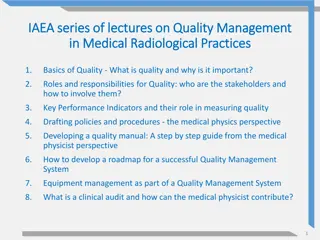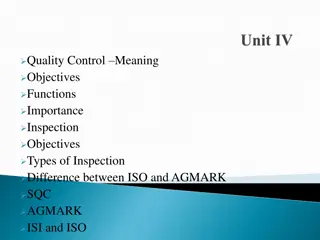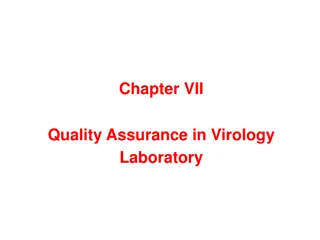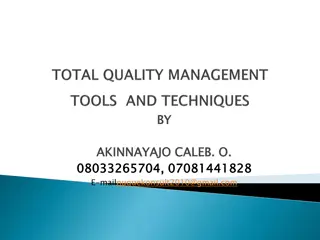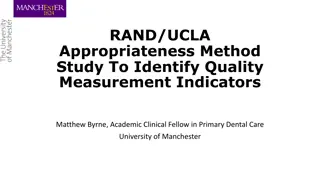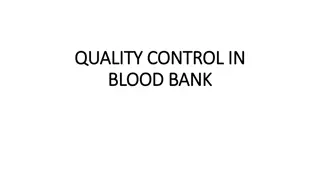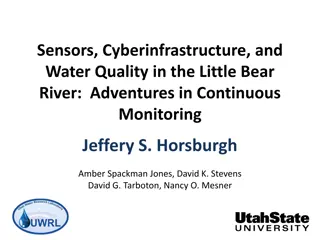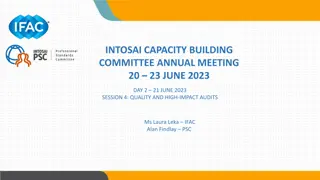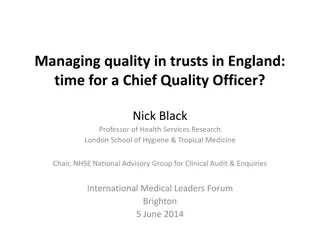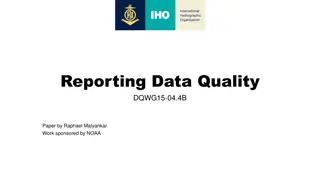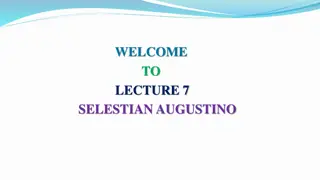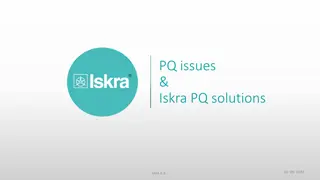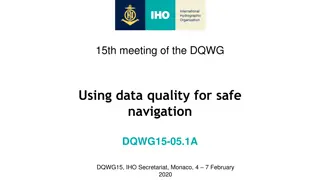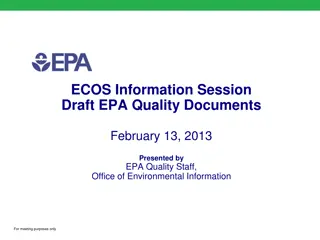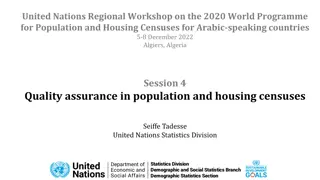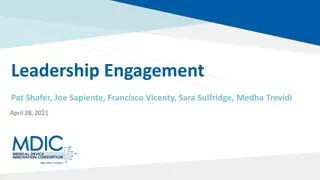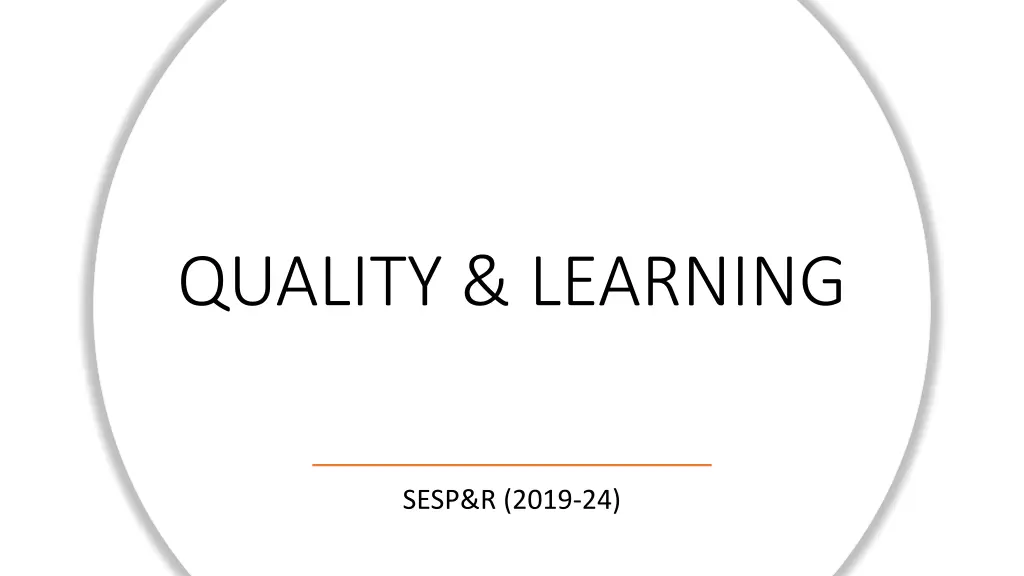
Influencing Quality Education Elements
Explore the six essential elements impacting the quality of education: teacher quality, teaching methods, educational content, learning environment, school management, and funding. Delve into teacher recruitment, qualifications, and professional development programs for enhancing educational inputs and processes. Discover initiatives like developing comprehensive ECCE standards and increasing availability of specialized teachers for ECCE services.
Download Presentation

Please find below an Image/Link to download the presentation.
The content on the website is provided AS IS for your information and personal use only. It may not be sold, licensed, or shared on other websites without obtaining consent from the author. If you encounter any issues during the download, it is possible that the publisher has removed the file from their server.
You are allowed to download the files provided on this website for personal or commercial use, subject to the condition that they are used lawfully. All files are the property of their respective owners.
The content on the website is provided AS IS for your information and personal use only. It may not be sold, licensed, or shared on other websites without obtaining consent from the author.
E N D
Presentation Transcript
QUALITY & LEARNING SESP&R (2019-24)
Six basic elements influence the quality of education. 1) The teacher and teaching methods 2) Educational content 3) Learning environment 4) School management 5) Preconditions for pupils 6) Funding and organization
TEACHER RECRUITMENT, QUALIFICATIONS AND PROFESSIONAL DEVELOPMENT Priority Programmes QUALITY INPUTS AND PROCESSES
Output 3.1: Comprehensive ECCE standards developed Output 3.1: Comprehensive ECCE standards developed Status Target 2019 - 21 Achieved to date Output Completed Has started Not started Percentage of schools with ECCE classes monitored annually on standards 45 % Completed / Has started / Not started ECCE standards for institutions, personnel and services Orientation sessions on ECCE standards at districts for all tiers Monitoring system for alignment of ECCE services with standards by upgrading existing monitoring application Intra-departmental coordination committee to scale ECCE and create linkages with ECE Linkages for parenting education, and strengthen collaborations with local communities including WASH, birth registration, Health, Nutrition and Polio/EPI Immunization 4 * ECCE working group has been notified
Output 3.2: Increased availability of teachers with specialized skills for ECCE services Output 3.2: Increased availability of teachers with specialized skills for ECCE services Status Target 2019 - 21 Achieved to date Output Completed Has started Not started Percentage of ECCE classes with teachers trained on ECCE concepts and standards 4,090 teachers trained 22 % Completed / Has started / Not started Provincial ECCE Provincial Plan developed 1500 ECE classrooms established (UNICEF) ECE strengthened in 140 selected Government Schools (Rupani Foundation) 100% female teachers recruited 3,200 primary class teachers trained on ECCE ECCE Syllabus and ECCE workbooks for students developed 750 new ECE teachers trained 120 awareness sessions arranged for parents (3,521 fathers and 3,668 mothers) and 70 afor SMC (360 SMC members) 2000 ECE classrooms under SHCI Project 2000 primary teachers to be trained SHCI project 19 GECES identified for resource centers on regional basis. 12 GECEs identified for offering one year diploma of ECCE to pre-service teachers
Output 3.4: Health and nutrition Output 3.4: Health and nutrition programmes programmes for children and adolescents implemented for children and adolescents implemented Status Target 2019 - 21 Achieved to date Output Completed Has started Not started Percentage of students in classes VI to X who have access to health and nutrition concepts and practices 100% 15 % Completed / Has started / Not started 402,264 students and parents sensitized (IRD-IHN, CHI-SPHP, Rupani Foundation) 30,500 teacher trained in collaboration with Kiran Sitara, CHI-SPHP, UNICEF and CIDA Curriculum/ Textbooks for Grades I-X updated LSBE ( Nutrition, WASH) material incorporated in textbooks, ECE Curriculum/ workbook and Non formal education (packages A, B &C) Chapters on nutrition for grade IX & X developed and incorporated in textbooks by EU-PINS Curriculum development of Physical & Health Education: SELD in collaboration with Right to Play
Output 3.4: Health and nutrition Output 3.4: Health and nutrition programmes programmes for children and adolescents implemented for children and adolescents implemented Status Target 2019 - 21 Achieved to date Output Completed Has started Not started Percentage of students in classes VI to X who have access to health and nutrition concepts and practices 100% 15 % Completed / Has started / Not started 13,187 Teachers trained in collaboration with IHN, CHI-SPHP program, and UNICEF 934 Teachers trained on MHM Girls Book on MHM developed LSBE curriculum frame work developed in collaboration with UNFPA DRR curriculum framework developed Curriculum for physical education as a mean to strengthen the physical education as a dedicated subject in the schools in Sindh. Messages on nutrition, developed by WRAP, added to the textbooks
Output 4.1: Strengthened institutional capacities of SELD for teacher training and professional Output 4.1: Strengthened institutional capacities of SELD for teacher training and professional development development Status Target 2019 - 21 Achieved to date Output Completed Has started Not started Capacity development plan for the teacher training and professional development function of SELD CD Plan designed and implemented Completed / Has started / Not started STEDA developed a plan for assessment of TTIs, STEDA, PITE for professional and development capacity building Institutional assessment for technical expertise for SELD units related to teacher training and professional development and Assessment Implementation capacity development plan (STEDA, PITE, DCAR, TTIs)
Output 4.2: Revised teacher recruitment and licensing policy implemented Output 4.2: Revised teacher recruitment and licensing policy implemented Status Target 2019 - 21 Achieved to date Output Completed Has started Not started Percentage of new teachers recruited with a license 0 % Completed / Has started / Not started Draft licensing policy developed Finalization and notification of Teacher Licensing is under process STEDA prepared the draft policy of teacher licensing with the support of AKU-IED. STEDA submitted a proposal for directors teacher licensing to the department
Output 4.3: Revised pre Output 4.3: Revised pre- -service teacher training strategy implemented service teacher training strategy implemented Status Target 2019 - 21 Achieved to date Output Completed Has started Not started Percentage of trainees enrolled on improved programmes 25 %
Output 4.4: Updated CPD Output 4.4: Updated CPD programme programme content for in content for in- -service support service support Status Target 2019 - 21 Achieved to date Output Completed Has started Not started Updated CPD programme content for in-service support Updated and approved Updated and under approval Completed / Has started / Not started Training Needs Assessment of serving teachers based on Student Assessment (NAT by PEACe) CPD Model finalized and notification in process Selection committee of Guide Teacher and Subject Coordinator Notified Clustering policy 2021 notified Manuals for CPD framework developed and are under certification process (Science, Mathematics, Language in Sindhi, Urdu & English languages
Output 4.5: CPD Output 4.5: CPD programmes programmes implemented implemented Status Target 2019 - 21 Achieved to date Output Completed Has started Not started Number of districts operating CPD through cluster/hub systems 23 districts Completed / Has started / Not started Conducted Training Needs Assessment of serving teachers based on Student Assessment (DCAR PEACe) along with CPD material CPD implementation to be initiated in 23 districts Selection of Guide Teachers and Subject Coordinators are under process (200) 40 clusters notified CPD manuals are under the process of certification Schedule for CPD activities have been approved Under selection Subject Coordinators (955)
Output 4.6: Needs assessment and M&E plan for CPD designed and implemented Output 4.6: Needs assessment and M&E plan for CPD designed and implemented Status Target 2019 - 21 Achieved to date Output Completed Has started Not started Number of districts where training needs assessment is conducted 10 districts M&E Plan M&E plan developed Completed / Has started / Not started Orientation started for District and Taluka school managers in CPD support (300 staff) Designing qualitative indicators in DGM&E application to assess the classroom practices.
Output 5.1: Revised curriculums for formal and non Output 5.1: Revised curriculums for formal and non- -formal education formal education Status Target 2019 - 21 Achieved to date Completed Has started Not started Formal education curriculums All subjects, all grades without gender bias NFE curriculum Skills-based curriculum At least 3 skills developed Adult literacy curriculum Curriculum developed
Output 5.2: Teachers trained in the revised curriculum and assessments Output 5.2: Teachers trained in the revised curriculum and assessments Status Target 2019 - 21 Achieved to date Output Completed Has started Not started Percentage of teachers trained to teach the revised curriculums 20 % Percentage of teachers trained on assessment of revised curriculum - Completed / Has started / Not started 3,277 JEST/ECT trained in induction training 2,079 SS/SSS/HM trained in mandatory training 7,000 teachers trained on revised grade 1 & 2 languages (sindhi and urdu ) curriculum and assessment (EGRA) Planning for training all teachers on revised curriculum through cluster-based model
Output 5.3: Textbooks and materials revised or adapted to teach the revised curriculum Output 5.3: Textbooks and materials revised or adapted to teach the revised curriculum Status Target 2019 - 21 Achieved to date Output Completed Has started Not started Percentage of textbooks revised or adapted 30 % Completed / Has started / Not started Grades I X Textbooks revised, printed and distributed (91 subjects) Grades XI XII Textbooks in writing process
Output 5.4: Teachers trained to use the revised textbooks Output 5.4: Teachers trained to use the revised textbooks Status Target 2019 - 21 Achieved to date Output Completed Has started Not started Percentage of textbooks revised or adapted 30 % 90% (I-X) Completed / Has started / Not started Teachers will be trained to use the revised textbooks after the implementation of clustering policy CPD implementation to be initiated in 23 districts Selection of Guide Teachers and Subject Coordinators are under process (200) 40 clusters notified CPD manuals are under the process of certification Schedule for CPD activities approved Under selection Subject Coordinators (955)
Output 5.5: ICT provided to support curriculum implementation especially in rural areas Output 5.5: ICT provided to support curriculum implementation especially in rural areas Status Target 2019 - 21 Achieved to date Output Completed Has started Not started Number of districts employing E- learning support Completed / Has started / Not started Microsoft, Sabaq, and UNICEF 30,787 teachers trained and 900,000 students benefited from digital learning We Think Digital: 57,000 Direct Beneficiaries and 172,000 indirect (Students & Teachers) Safe Internet: 50,000 Direct beneficiaries and 126,000 Indirect Beneficiaries ITA Digitized teaching and learning material for effective classroom engagement from ECE to Grade X Engaged firms that provide ICT solutions for e-learning, and initiate innovative interventions for effective teaching and learning Continuing of Learning Framework, Rubrics for Teachers and Rubrics for Students developed, and arrangements of deployment of Learning Passport finalized Digital Strategy under development
Output 5.6: Capacity of DCAR/ Output 5.6: Capacity of DCAR/PEACe assessment system assessment system PEACe enhanced for developing and implementing a student enhanced for developing and implementing a student Status Target 2019 - 21 Achieved to date Output Completed Has started Not started Capacity development plan to conduct learning assessments and analysis Plan implemented Completed / Has started / Not started PEACe staff trained on paper and tablet-based Early Grade Reading Assessment (EGRA) Pakistan Reading Project Review and improve SESLOAF Recruit specialized staff for the tasks at DCAR/PEACe and DG M&E (9 staff/consultants) Develop and implement digitized assessment system for students (Class 5 and 8) through software and pilot in 6 Regional Headquarters Impact assessment through digital and prepare feasibility report (2022) Train PEACe staff on paper and tablet-based Early Grade Maths Assessment (EGMA)
Output 5.7: Decentralized implementation of SESLOAF expanded Output 5.7: Decentralized implementation of SESLOAF expanded Status Target 2019 - 21 Achieved to date Output Completed Has started Not started Full scale assessments conducted by DCAR/PEACe Once class 5, once class 8 Class 5 Completed / Has started / Not started Sample-based PEACe conducted for class 5 Sample-based assessment of class 8 is under planning
Output 5.8 Quality assurance policy framework developed at all levels Output 5.8 Quality assurance policy framework developed at all levels Status Target 2019 - 21 Achieved to date Output Completed Has started Not started Quality assurance policy framework 0 Completed / Has started / Not started Quality assessment indicators in DG M&E application and orientation sessions for classroom observations to be planned


